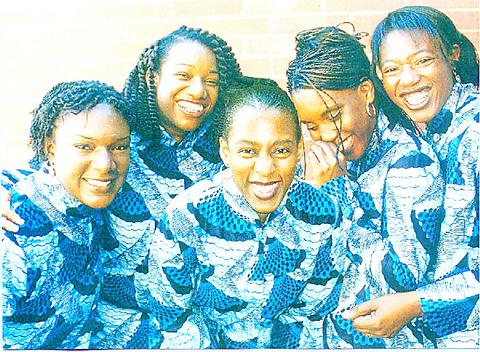For vocal music lovers, the coming week will offer a great time when the fourth Taipei International Choral Festival (
When the Taipei Philharmonic Cultural Foundation (

PHOTO COURTESY OF TAIPEI PHILHARMONIC CULTURAL FOUNDATION
This year's festival is aimed at showcasing a broader range of musical styles. "As the reputation of the festival has spread in the past six years, more and more foreign groups are offering to participate, giving us more choice in selection," Du said. The six foreign groups from diverse musical backgrounds include the National Chorus of Korea, San Miguel Master Chorale from the Philippines, Canada's Vancouver Chamber Choir, Black Voices from the UK, Sweden's Gustaf Sjokvists Chamber Choir and Kammerchor Stuttgart from Germany.
"We would like to present more than standard choral numbers. The emphasis is on whether the groups express their cultures. The Black Voices' jazz style and San Miguel Master Chorale's humorous rendition of Philippine folk songs as well as the National Chorus of Korea's solemnness make the event more culturally diverse," Du said.
At the inaugural concert on Sunday, Du will perform Buddhist Requiem with the Taipei Philharmonic Chorus. Composed by the prestigious Taiwanese composer Chien Nan-chang (
The Vancouver Chamber Choir, one of the highlights of the festival, will go on stage Monday with their renditions of Celtic folk songs and hymns. On Tuesday, the National Chorus of Korea will perform with the San Miguel Master Chorale, both famous for stylish interpretations of traditional music. Next, Gustaf Sjokvists Chamber Choir will present an array of contemporary works and modern Swedish folk songs on Wednesday. Black Voices, who specialize in African folk songs and gospel music, will go on stage Thursday. Their interpretations of pop songs like Sting's Fragile are sure to turn your ear while traditional Zambian folk songs like Anweba are guaranteed to carry emotional strength. Kammerchor Stuttgart is another highlight of the festival. The group will perform Romantic-era songs on Friday.
Tickets are available through Acer ticketing outlets at NT$300 to NT$1,500. Discount ticket sets are also available by calling the organizer at (02) 2773-3691.
Four afternoon concerts will be held free of charge. Black Voices will perform Sunday at 3pm at Living Mall's Gravity Floor; Vancouver Chamber Choir will perform Monday at 12:30pm in the lobby of New Building at National Taiwan University Hospital; The National Chorus of Korea will perform with San Miguel Master Chorale at the same location at 12:30pm Tuesday; Gustaf Sjokvists Chamber Choir will perform at the same time and location Thursday.

In the March 9 edition of the Taipei Times a piece by Ninon Godefroy ran with the headine “The quiet, gentle rhythm of Taiwan.” It started with the line “Taiwan is a small, humble place. There is no Eiffel Tower, no pyramids — no singular attraction that draws the world’s attention.” I laughed out loud at that. This was out of no disrespect for the author or the piece, which made some interesting analogies and good points about how both Din Tai Fung’s and Taiwan Semiconductor Manufacturing Co’s (TSMC, 台積電) meticulous attention to detail and quality are not quite up to

April 21 to April 27 Hsieh Er’s (謝娥) political fortunes were rising fast after she got out of jail and joined the Chinese Nationalist Party (KMT) in December 1945. Not only did she hold key positions in various committees, she was elected the only woman on the Taipei City Council and headed to Nanjing in 1946 as the sole Taiwanese female representative to the National Constituent Assembly. With the support of first lady Soong May-ling (宋美齡), she started the Taipei Women’s Association and Taiwan Provincial Women’s Association, where she

Chinese Nationalist Party (KMT) Chairman Eric Chu (朱立倫) hatched a bold plan to charge forward and seize the initiative when he held a protest in front of the Taipei City Prosecutors’ Office. Though risky, because illegal, its success would help tackle at least six problems facing both himself and the KMT. What he did not see coming was Taipei Mayor Chiang Wan-an (將萬安) tripping him up out of the gate. In spite of Chu being the most consequential and successful KMT chairman since the early 2010s — arguably saving the party from financial ruin and restoring its electoral viability —

It is one of the more remarkable facts of Taiwan history that it was never occupied or claimed by any of the numerous kingdoms of southern China — Han or otherwise — that lay just across the water from it. None of their brilliant ministers ever discovered that Taiwan was a “core interest” of the state whose annexation was “inevitable.” As Paul Kua notes in an excellent monograph laying out how the Portuguese gave Taiwan the name “Formosa,” the first Europeans to express an interest in occupying Taiwan were the Spanish. Tonio Andrade in his seminal work, How Taiwan Became Chinese,